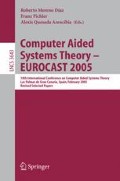Abstract
The Fuzzy Constraint Networks model, a generalization of the Disjunctive Temporal Fuzzy Constraint Networks, is a framework that allows representing and reasoning with fuzzy qualitative and quantitative complex constraints. However, its general complexity is exponential, and we need to find tractable subclasses. In this paper we propose two algorithms to deal with a tractable subclass named Series-Parallel Fuzzy Constraint Networks.
Access this chapter
Tax calculation will be finalised at checkout
Purchases are for personal use only
Preview
Unable to display preview. Download preview PDF.
References
Bosch, A., Torres, M., Marín, R.: Reasoning with Disjunctive Fuzzy Temporal Constraint Networks. In: Proc. of 9th Int. Symposium on Temporal Representation and Reasoning (TIME 2002), pp. 36–43. IEEE Computer Society Press, Los Alamitos (2002)
Bosch, A., Guil, F., Martinez, C., Marín, R.: Series-Parallel and Tree-Decomposition Approaches for Fuzzy Constraint Networks. In: Garijo, F.J., Riquelme, J.-C., Toro, M. (eds.) IBERAMIA 2002. LNCS (LNAI), vol. 2527, pp. 275–284. Springer, Heidelberg (2002)
Dechter, R., Meiri, I., Pearl, J.: Temporal constraint networks. Artificial Intelligence 49, 61–95 (1991)
Dechter, R., Pearl, J.: Network-based heuristics for constraint-satisfaction problems. Artificial Intelligence 34, 1–38 (1987)
Dubois, D., Prade, H.: Possibility Theory: An approach to computerized processing of uncertainty. Plenum Press, New York (1988)
Marin, R., Barro, S., Bosch, A., Mira, J.: Modeling time representation from a fuzzy perspective. Cybernetic & Systems 25(2), 207–215 (1994)
Marín, R., Cardenas, M., Balsa, M., Sanchez, J.: Obtaining solutions in fuzzy constraint networks. Int. Journal of Approximate Reasoning 16, 261–288 (1997)
Montanari, U.: Networks of constraints: fundamental properties and applications to picture processing. Information Science 7, 95–132 (1974)
Schwalb, E., Vila, L.: Temporal Constraints: A Survey. Constraints 3(2/3), 129–149 (1998)
Wald, J.A., Colburn, C.J.: Steiner Trees, Partial 2-Trees and Minimum IFI Networks. Networks 13, 159–167 (1983)
Author information
Authors and Affiliations
Editor information
Editors and Affiliations
Rights and permissions
Copyright information
© 2005 Springer-Verlag Berlin Heidelberg
About this paper
Cite this paper
Bosch, A., Guil, F., Marin, R. (2005). A Tractable Subclass of Fuzzy Constraint Networks. In: Moreno Díaz, R., Pichler, F., Quesada Arencibia, A. (eds) Computer Aided Systems Theory – EUROCAST 2005. EUROCAST 2005. Lecture Notes in Computer Science, vol 3643. Springer, Berlin, Heidelberg. https://doi.org/10.1007/11556985_36
Download citation
DOI: https://doi.org/10.1007/11556985_36
Publisher Name: Springer, Berlin, Heidelberg
Print ISBN: 978-3-540-29002-5
Online ISBN: 978-3-540-31829-3
eBook Packages: Computer ScienceComputer Science (R0)

